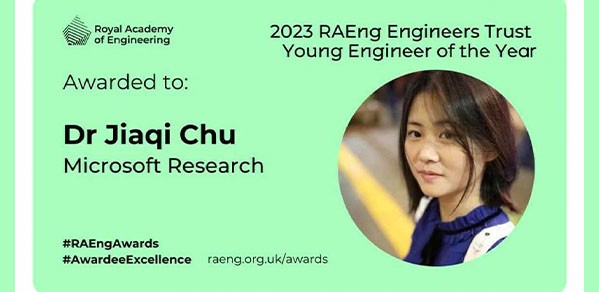
Electrical Engineering alumna Dr Jiaqi Chu has been named a winner of the 2023 RAEng Engineers Trust Young Engineer of the Year competition.
My time at the University of Cambridge Electrical Engineering Division was invaluable. The research exposure I acquired there fostered my passion for optics.
Dr Jiaqi Chu
During her PhD studies at Cambridge Electrical Engineering, Dr Chu was supervised by Professor Daping Chu.
Professor Daping Chu holds the position of Nanjing Chair of Technology and Innovation and is Director of both the Centre for Photonic Devices and Sensors (CPDS) and the Centre for Advanced Photonics and Electronics (CAPE). He said: “Many congratulations to Jiaqi on this prestigious award. It is fantastic to see the tremendous achievements that she has made so far being recognised, and we wish her all the best in her future development.”
Dr Chu is working on novel optical storage and optical computing technologies to tackle the hardest infrastructure challenges facing cloud providers due to the slowdown of Moore’s Law. This Law predicted continued growth in the capacity and speed of silicon-based computing and has been the guiding principle that has driven the computer chip industry.
Dr Chu developed a technique to read and write data as holograms into crystal and experimentally demonstrated the highest density of holographic optical data storage achieved to date, as well as quantifying the energy efficiency of such storage and the theoretical limits of its capacity. Her work not only advances scientific understanding in the field but shows a path towards energy-efficient holographic optical storage in the cloud, which has the potential to lower storage costs.
Dr Chu said: “My time at the University of Cambridge Electrical Engineering Division was invaluable. The research exposure I acquired there fostered my passion for optics. During my PhD studies, I was primarily focused on exploring the orthogonality characteristics of the light’s orbital angular momentum (OAM). I was introduced the concept of utilsing OAMs orthogonality for 2D information encoding. Motivated by this innovative concept, I proceeded to investigate a unique and efficient approach. Under the supervision of Professor Chu, we successfully confirmed the viability of this concept, both theoretically and experimentally.”
Dr Chu is currently a Principal Researcher at the Microsoft Research Lab in Cambridge, developing a noise-tolerant optical computer that could have a significant impact on the economic and environmental sustainability of artificial intelligence (AI) and optimisation workloads.
This article first appeared on the Division of Electrical Engineering, University of Cambridge website.

